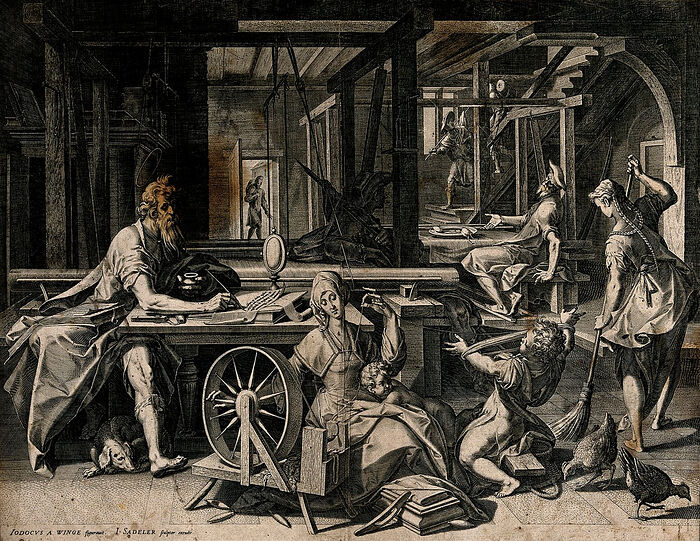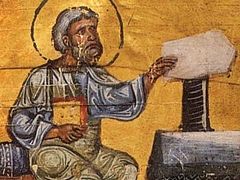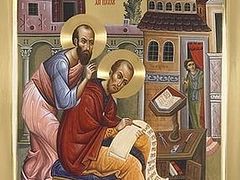 St. Paul is staying in the house of Aquila and his wife Priscilla, the family are making tents and St. Paul is writing. Engraving by J. Sadeler after Jodocus Winghe. Photo: wikipedia.org
St. Paul is staying in the house of Aquila and his wife Priscilla, the family are making tents and St. Paul is writing. Engraving by J. Sadeler after Jodocus Winghe. Photo: wikipedia.org
Our beloved Father among the Saints, St. John Chrysostom (c. 347–407), the greatest Christian preacher who ever lived, peached two sermons specifically on Saints Priscilla and Aquila. This married couple were Jewish converts to Christ who were living in Rome when the Roman Emperor Claudius, in about the year 49 A.D., expelled all the Jews from that city “on account of disturbances among them over Chrestus” (an obvious reference to Christ), according to the Roman historian Suetonius.
Priscilla and Aquila fled to Corinth, where St. Paul had recently come while on his very extended second missionary journey. Because they were fellow tentmakers, Paul stayed in their house for nearly two years as he preached and labored in Corinth (see Acts 18:1-11).
Priscilla and Aquila then accompanied Paul when he left Corinth to go to Ephesus (Acts 18:18-19). There the husband and wife missionary team hosted a house-church in their home; and it was here that Priscilla instructed Apollos further in the way of Christ (Acts 18:24-28).
Later, Priscilla and Aquila returned to Rome, where again a house-church met in their home. So when Paul writes his Epistle to the Romans, he includes these words:
Greet Priscilla and Aquila, my fellow-workers in Christ Jesus, who risked their own necks for my life, to whom not only I give thanks, but also all the churches of the Gentiles. Likewise great the church that is in their home (Romans 16:3-5).
These verses are the Scriptural text that forms the basis for St. John’s two sermons on Priscilla and Aquila.
The Greek text of this sermon is found in J. P. Migne, Patrologiae Graeca, vol. 51.187C-196B. I was assisted in doing my new translation of it by an unpublished translation of it done by Catherine Kroeger. As far as I know, this sermon has never been published in English translation.
I’ve added subheadings to aid the reader in following the flow of the sermon.—Dr. David Ford
There is nothing superfluous in the Scriptures
I suppose many of you are marveling at this portion of the Epistle reading for today [Romans 16:1-16], and especially that one might reflect upon this seemingly incidental, superfluous part of the epistle, which only has frequent salutations in quick succession. Today, then, I’m prepared to shift from what we spoke about previously, and to expound upon this assertion: that in the Divine Scriptures, there is nothing superfluous, nothing incidental, even if it’s one iota, even if it’s one period.
Indeed, even a mere greeting opens up for us a great sea of considerations. And why do I say “a mere greeting”? Often even the addition of a single letter can bring in a whole new meaning. This can be seen in the naming of Abraham (cf. Gen. 17:5).
How would it not be out of place, upon receiving a letter from a friend, to only read the main part of the letter, and not also the salutation in which is discerned the disposition of the writer? In this case, it’s Paul who is the writer—though not really Paul, but the grace of the Holy Spirit—and it’s composed for an entire city and such a great populace—and through them, for the whole world!
Thinking that certain parts of the Scriptures are superfluous, and so skipping over them without reflecting upon them, is what has made everything upside down. This, yes this, is what fills us with great indifference (rathumia): not to immerse ourselves in all the Scriptures. Rather, we decide which parts are clearer; and selecting these, we consider the rest to be of no account. This is what leads to heresies: not wishing to be immersed in the entire corpus of the Scriptures, and to decide which parts are superfluous and incidental.
“We must study all of it diligently”
For this reason, we must study all of it diligently, not only what seems to be superfluous, but also what seems to be incomprehensible and vexing. For experiential knowledge (empeiria) of all the Scriptures has been neglected and overlooked.
Yet those excited at the sight of a horserace can say with complete accuracy the names, and herd, and pedigree, and birthplace, and rearing of the horses, and also their age and racing ability; and which horses, if matched against which, will gain the victory; and which horse from which starting gate, and having which driver, will win the race, outpacing its rival.
Those devoted to the theaters demonstrate no less enthusiasm. Indeed, they have greater mania for those conducting themselves disgracefully on the stage—I mean mimes and dancing girls—and they can categorically state their ancestry, and birthplace, and training, and everything else.
But when we are asked how many, and to whom, are the Epistles of Paul, we cannot give the number. And if those who do know the number are asked which cities received the Epistles, they’re at a loss to answer the question.
Yet a certain man, a eunuch and barbarian, although burdened with a myriad of cares and business concerns, nevertheless, so that he would not waste his time in idleness while on a journey, while sitting in his chariot he devoted himself to reading the Divine Scriptures—and hence he himself got included in the Scriptures (Acts 8:26-39). Yet we, who do not have such lack of leisure as that man had, do not welcome the names in the Epistles, gathering them from the readings on each Lord’s Day and enjoying Divine instruction about them.
But lest our discourse only be a rebuke, come, let’s proceed into the midst of the greeting that may appear superfluous and even irritating. When the greeting is carefully examined, and the gain therefrom is made clear to those who listen with diligence, then greater will be the accusation against those who neglect such treasures, who cast from their hands such spiritual riches.
Only a mere greeting?
So what is this greeting? “Greet Priscilla and Aquila,” he says, “my fellow-workers in the Lord” (Romans 16:3). So then! Does it not seem to be a mere greeting, revealing to us nothing great or noble?
Come then, let us devote our entire homily to this greeting alone. And actually, our words spoken today will not suffice to draw out for you all the meaning of these few words in the Scripture. We will have to save for another day the rest of the abundance of insights which are generated by this little greeting. For I’m not prepared to go through the whole passage that was read today—just the beginning of it: “Greet Priscilla and Aquila.”
Paul’s care for all the churches
First to be mentioned is Paul’s virtue—how he had taken in hand the whole world, both land and sea; and all the cities under the sun, both barbarian and Greek, and all the people moving about in them; and yet he had such solicitude for this one man and one woman.
Second is this marvel—how despite being sleepless and having a soul heavily burdened with cares, he not only cared for the whole world in general, but he also had special regard for each person who was approved and noble. It’s not surprising, in having to quell tumults, in being given oversight over a city—and besides this, due to the magnitude of the dangers, the length of the journey, the plethora of concerns, the endless succession of waves, the ceaseless visitation of all of this and of much more besides—that Church leaders would drop from their memory those who are completely dependable to be useful helpers.
But Paul did not forget those who were like that. And why were they not forgotten? Because of Paul’s greatness of soul (megalopsychian), and his fervor, and his genuine love (agapēn). He had them in mind so much that he frequently remembered them in his epistles.
Priscilla and Aquila’s humble status
But now let’s see what sort of people these were who took Paul into their hands, who drew to themselves his great affection (pothon). So then! Were they consuls or generals? Were they rulers? Had they attained some other eminent distinction? Were they compassed about with much wealth? Were they magistrates of the city? Nothing like this can be said of them—rather, the complete opposite. For they were poor and needy, living by the labor of their hands. For, it says, “They were tentmakers by trade” (Acts 18:3).
And Paul was not ashamed, neither did he consider it a matter of reproach, to command the imperial city and its haughty people to greet those two artisans. Nor did he consider his love (philia) for this couple to be an insult to the city.
Now that we have explained these things, let’s now give a spiritual exhortation (philosophein). Often with us, if we have relatives who are even just a little less well-off than we are, we avoid close association with them; and we consider it to be a reproach to us if it’s discovered that we’re related to them. But Paul was not like that. Rather, he took pride in his occupation. And not only to his contemporaries, but also to all those coming afterwards, he made it clear that those tentmakers were among the first to perfect (eteloun) their love (philian) for him.
And let no one say to me, “And what’s so marvelous about that?—that he, being of the same trade as they, would not be ashamed of his fellow tradesmen?” What are you saying? This was indeed great and marvelous. For those who are suddenly raised up from a low status to a high distinction often become disdainful of those who are thereby inferior to them. But no one was more illustrious than Paul; no one was more eminent. He was more distinguished than kings themselves, as is evident to all. For he commanded demons, and raised the dead; and by his command, he was able both to make blind, and to heal those who were blinded. His clothing and his shadow healed every form of disease, so that he was considered to be no longer a man but a certain angel come down from Heaven.
And yet, while enjoying such glory, and being marveled at everywhere, and converting everyone wherever he might appear, he was not ashamed of the tentmakers, neither did he expect those in high station to disdain those beneath them in dignity. For it’s likely that there were many who were illustrious in the Church of the Romans whom he was constraining to greet these poor folk. For he knew, he clearly knew, that nobility is produced not from the splendor of wealth or the abundance of riches, but rather from the mildness and equanimity (epieikeia) of one’s life.
The Romans were deficient in this virtue; and they were arrogant, due to the glory of their forebears. They were adorned with the mere name of nobility, but not the reality. Often even the claim to nobility does not bear scrutiny, if one investigates the lineage of these “nobles” further back. For if you consider someone who’s famous and illustrious, whose father and grandfather he could say also were distinguished, and you investigate with precision, often you will find that his great-grandfather was of common birth, with an obscure name. Similarly, if we inquire a bit into the lineage of those who appear to be commoners, we will often find among their ancestors rulers and generals who might then have become swineherds and groomsmen of horses.
Their nobility of soul
All of this Paul understood, but he did not consider these things to be of much account. For he sought nobility of soul, and he taught others to marvel at this.
Thus far we have reaped not a little fruit from these few words: to not be ashamed of anyone in a more lowly state, to seek excellence of soul, and to recognize the significance of everything around us that appears externally to be superfluous and unprofitable.



